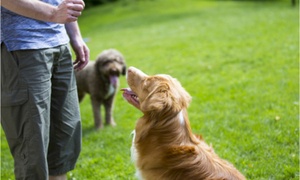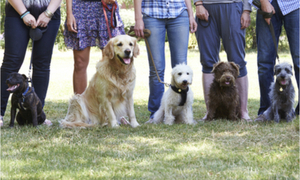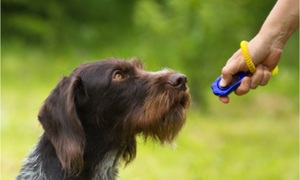
Do you have a list of questions to ask a dog trainer? Do you know how you will decide who to trust with your dog’s training, care, and education?
Las Vegas offers some of the best trainers to help your dog become a respectful family member.
More...
Although this may be true, if you fail to make the correct decision in who you hire to train your dog, you will not only fail to have your dog properly trained, but the inadequate training can make the dog’s behavior worse and make it hard to correct his or her behavior later.
There is no perfect method for choosing the best trainer for your pet. You have many factors to consider when selecting a trainer.
Asking questions from prospective dog trainers will help with your decision-making process when selecting the right person to train your dog.
In this post, you will find a list of questions to ask potential trainers.
Header | |
|---|---|
1 | How are classes organized? |
2 | How will my dog understand that I am the leader? |
3 | How do you gauge your success? |
4 | How do you address stress, fear, anxiety during training? |
5 | How do you identify your trainers' needs in your training school? |
6 | How much should I feed my dog before training? |
7 | How will you discipline my dog or advise me on teaching my dog if he exhibits bad behavior that I don’t like? |
8 | How do you continue your training education? |
9 | How do you make sure that my dog is not unintentionally disciplined? |
10 | How do you deal with the conflict between dogs in your care? |
11 | How do you know that the technique that you selected for my dog is suitable? |
12 | How will we know my dog's stress level during our sessions? |
13 | What are your rates? |
14 | |
15 | What certifications do you have that qualify you as an expert trainer? |
16 | What was your most challenging training experience, and how did you handle it? |
17 | What particular training skills do you have that other trainers don’t exhibit? |
18 | Do you use any physical punishment? |
19 | What method will you use to housetrain my dog, and how long will it take? |
20 | What are the key criteria for practical training? |
21 | What are your strengths as a dog coach? |
22 | |
23 | If a dog is growling and snapping at other people and dogs, how would you go about adjusting its behavior? |
22 | Do you use training equipment? Should I use the same equipment when my dog is at home? |
25 | Will I be able to apply the training techniques once my dog has finished your training course? |
26 | If you use treats or food to train my dog, will I always have to use that training method? |
27 | Do you consider treat training bribery? |
28 | Describe a past training program with successful results? |
29 | Do you offer free consultations? |
30 | Do you have former clients that I can contact? |
Header | |
|---|---|
31 | If you train with treats, will my dog become fat or obese? |
32 | Can I visit and observe a class? |
33 | Can you provide testimonials? |
34 | Do you own dogs? Can I view you in action with them? |
35 | How long should I use the clicker method or training tool after training? |
36 | How long have you been in business? |
37 | How long have you been teaching dogs? |
38 | What are your training and educational background? |
39 | What are your training beliefs? |
40 | What training methods are most effective in your opinion? |
41 | Are the exercises easy to follow? What do you expect from the dog each week? |
42 | Are you a current member of a pet professional organization? |
43 | How long does it take you train dogs? |
44 | How long will it take before I see results with my dog from your training program? |
45 | What happens when my dog responds accurately during training? |
46 | What happens when my dog responds improperly during training? |
47 | Why do you like working with dogs? |
48 | My dog walks in front of me and stops. Why is that? |
49 | Why is my dog restless? |
50 | Why does my dog pull on the leash? |
51 | How do you stay updated about the current developments and ideas about dog training? |
52 | How have you handled difficult dog training issues? |
53 | Have you experienced other cases with dogs that have the same problems like mine? |
54 | In your opinion, why do dogs bark at doorbells? |
55 | Can you train my dog to protect me? |
56 | Do you have experience in both obedience and behavioral adjustments? |
57 | Do you work with all breed of dogs? If not, why? |
58 | Is there a specified amount of time that I should crate my dog? |
59 | Do you do follow-ups once training is complete? |
60 | What kind of collars do you use for training? |
61 | Do you make learning fun? |
Domesticated pets are invaluable friends. That is why coaching pets in an acceptable way is about helping them become compatible and socially acceptable.

Dogs are often thought of as a person’s family member or a best friend.
Dogs, in most cases, are loyal and ask hardly anything in return for the unconditional love they show to their owners.
Educating and instructing your dog is, therefore, very important for delighting in a continuing comfortable bond.
Coaching your dog to exhibit good behavior and respect gives it the required ability to become a suitable occupant.
The process of dog training involves adjusting bad behavior and making the dog follow your orders.
It is essential to retain a professional accustomed to various dog training modalities and methods that can enable them to quickly tailor to the specific dog and owner’s requirements, thereby helping to expedite the training course.
Expert dog trainers have the knowledge required to grasp and handle dogs.
To put it differently, they have a broad exposure to canines, making it easier for them to help owners with dogs that have behavioral issues, thereby training their pets to be well-behaved canine citizens.
A good structured obedience program will benefit any dog and its owner.
It creates a stronger bond between you and your dog as well as ensuring that you become and maintain a stronger pack leadership role.
You probably think that you want a pet that is easy to walk, friendly to others, and understands your directions.
The only issue is that not everyone can or even should attempt to teach their dog. Yes, some can and achieve successful DIY obedience training, while others will create an unruly dog.
The question is, should you consider hiring a professional to coach your dog?
Selecting the right trainer for your pet is necessary for teaching it discipline at the earliest time achievable.
There are many dog trainers, and the benchmark for choosing one appears to change at the slightest.
You can read reviews online and read articles about trainers on their websites and their abilities if you are considering employing one.
You have many options when you want to locate the right trainer for you and your pet. One of the top ways to find a trainer is to ask your veterinarian to refer you to an excellent trainer.
You can seek out trainers through family, friends, the Internet, or the telephone book.
Other options include asking dog owners who have well-behaved dogs and ask them what training techniques they’ve used or trainers that they recommend for your pet.
It is critical to receive the proper trainer for your pet, and the techniques that the trainer will use are also of great importance for you, the owner.
As with teachers for children, you should check out who is teaching your dog. A trainer is much like a coach or teacher for children.
Puppies and full-grown dogs have to learn manners and boundaries as with children. A polite child is a pleasure to be around, and so is a respectful dog.
Now you must consider what your dog trainer expects from you as a client? Do you work full time?
If so, then you may not be too thrilled about a trainer expecting you to put in an hour or more with your dog before or after work, and your dog might not care for that before or after their professional obedience training sessions.
Under those circumstances, an experienced trainer should, for the most part, ask you to set aside three 5 minute periods a day to train your dog.
It would help if you made a mental note that you and your pet will benefit from what you are inclined to put into the training sessions.
As a result, short to the point, fun sessions are the best.
Blue Ribbon K9 of Las Vegas specializes in providing you with all the tools and knowledge needed to train your dog to listen to you the first time.
Our professional Las Vegas dog training experts will guide you through our proven “incremental positive reinforcement method”.
Our proven methods will provide you with all the tools you need to build a thriving friendship with your dog.
Call a few schools and ask them standard questions about their training techniques.
Always speak with multiple people before deciding on one trainer.
The people that you call who take the time to talk, answer questions, or return your call in a short amount of time should stay at the top of your list.
Often, this means that they value their dog training services.
Now when you have a trainer on the phone, ask them how much attention you and your pet will receive?
The duration of each session? Can you delay sessions if your pet isn’t responding/learning in a timely manner?
Animals demand unlimited patience to comprehend what it is that you want them to do? Also, you should never get angry with your dog during training.
Most Professional trainers get that patience, dedication, and gentleness are required when training dogs.
Do they offer extra sessions if you miss a class with your pet? Do they provide at-home support between sessions?
If you have any questions, how long will it take for them to answer your inquiries?
Nevertheless, take some time and digest the information that was provided by the professional.
Now, if they seem defensive about a particular view on training before they meet you or your pet, then move on and look for someone else.
The questions that you ask are extremely important so that you are confident that the trainer that you select is the right match for you and your pet.
Don’t hold back when asking your questions. You have the right to investigate the trainer and their training techniques since you will leave your pet in their care for the training process.
In addition, you will also want to inquire about any training devices that they may employ, such as the clicker method.
Do you think that your dog will respond to training tools? Would you feel at ease with a device used on your dog?
Ask for a free consultation. You don’t have to pay a trainer to look at your dog, and then decide if they are the best choice for your pooch.
You should make several appointments with different trainers to interview them; for the most part, many trainers will not charge for a meeting to assess you and your dog.
After you have pinned down the phone numbers of training schools, then your next stage is to visit the trainers.
You should visit the trainers while they are teaching a class, which is the best way to see if their methods are something that you and your pet can handle.
What you want to see are happy, alert dogs who are eagerly watching their masters.
Likewise, the owners will appear engaged, content, and smiling with the results of the training session.

Go a step further and talk with a few owners after a class to ask a few questions.
You will come across some dog trainers that you may view that are not good teachers.
For this reason, you should seek out teachers with excellent communication skills and even better teaching skills.
With their expertise, they can teach your dog to learn faster and make the experience pleasant for you, the owner.
Your objective is to observe how the trainer interacts with your dog. You should also observe the training method used on your pet.
If you are uneasy with how they are treating your pooch, then you will probably not stay with the training techniques at home, which will result in disorder and non-performance with your pet.
Real professionals will always share their viewpoints on training dogs and clarify their procedures and logic for training.
Professional dog trainers that have a genuine passion and love for dogs will make the training even more successful.
Whatever the dog’s quirks, problems, age, or energy level, you can be assured that this is a dependable, reputable trainer with a virtually encyclopedic knowledge of dog training and the subtlety to take the approach that will work best with YOUR DOG.
Make sure that the trainer that you select has experience handling different dog behavioral problems, especially with your breed.
Various breeds call for different training styles. An instructor that has worked with different breeds should be able to train different personalities.
Experience with different breeds of dogs can help the trainer apply methods that are best suited for your particular dog breed.
Also, experience involves more than a few initial rounds of training. The trainer will have undergone various teaching conditions from their vast knowledge of training many different dog breeds.
The trainer's experience is a great way to gauge their various teaching methods or techniques.
The trainers have to consider the temperament and characteristics of each dog.
You have to give proper kudos to trainers who know their stuff. A lot of them have had time to really learn the nuts and bolts of training dogs in an effective manner.
Moreover, their experience offers them an unmatched insight into the whole process of training that a good chunk of owners can’t unmask on their own.
For this reason, owners should leave the training to the professionals.
If you are thinking about hiring a rookie dog trainer, then you should inquire about their past experiences prior to starting their training profession.
It would help if you asked them about the different breeds of dogs they’ve handled.
At MP K9 All Breed Dog Training, we will surprise you with our traditional no-collar methods and innovative dog training techniques.
With us, your dog will quickly learn how to follow your orders, with or without a reward.
Our priority is to provide your dog with the love and care they need and deserve because we believe that dogs are spurred on to learn in a playful environment.
MP K9 All Breed Dog Training
Ask the trainer to provide references from past clients that you can contact. If they are unwilling to give recommendations, then move on!
Most talented and qualified trainers are happy to give out their testimonials and references for you to contact.
Your main goal here is to inquire about the quality of training provided by the trainer.
At Sit Means Sit Dog Training, we work to ensure each dog is receiving the best possible training for their personal needs.
Each plan is personalized to help your canine become their most confident, obedient, and polite self.
With our professional and experienced Vegas dog trainers, you’ll know your pups are in the best care possible.
They’ll turn even the most aggressive dogs into well-behaved and obedient canine companions.
Does the trainer have any certifications? If so, what agencies provided them with the certification? Do your research!
If your trainer has a certificate, then you can rest assured that they’ve passed the minimum requirements of handling dogs.
Yes, there are many talented instructors without any formal certification. But it is reassuring to know that a trainer has training from a structured training program.
Based in Las Vegas, NV, The Dog Training Center is the right choice for anyone who wants to take his or her dog to a place where learning and playing go hand and hand.
Renowned for our excellent obedience training methods and professional techniques, our experts are enjoying a stellar reputation among their colleagues in this field.
The Dog Training Center
You have to ask yourself what techniques are you comfortable with for your pet? Do you favor positive reinforcement with tons of rewards?
Do you know what type of rewards that will make your dog respond to your commands? Would your dog prefer for you to pet him or her? Would your pooch prefer to play a game of fetch? Does your dog like food treats?
If you know these things, then you can ask the trainer to vary their reward system for your dog. As with humans, they are not all the same, and the same can be said of dogs too.
People learn in a variety of ways, and so do dogs. Hopefully, the trainer will know this and adjust their techniques and training accordingly.
Make sure that you are paying for your results from the training. Professional trainers know that every owner and dog are different, and some animals need more practice than others.
It is better for you and your dog to work with a quality dog training program than to throw your money away on a bargain training deal.
Thus, avoiding having to pay extra money in the long run to fix issues that could have been avoided with a first-rate training program.

Dog trainers are not right for every client that enters their program. Many trainers use various techniques and methods to train dogs.
With that said, some people aren’t comfortable with certain training methods, which leads to conflict between trainer and owner.
Thus, inquire about the proper training method that you feel comfortable with for your pet.
In the long run, your pet is with the trainer for a few hours per week, but you are the one who has to follow-up with the training the remainder of the time.
The dog coach that you pick should follow the same values if you expect to get along with the trainer.
Our camps are designed to meet your training goals in a relatively short amount of time with deliberately scheduled follow-up lessons and maintenance training visits.
We are a results-oriented group and strive for excellence.
We also believe success in dog training is not a destination, but a journey.
Group sessions are beneficial for your dog for the socialization value of the course.
On the other hand, you have to learn how to implement these sessions in real-world environments.
If you train around your neighborhood with a trainer, the events that present themselves while you have an instructor with you will help you learn to handle these events first hand with a professional.
In the group sessions, you have to learn how to transition these events to the real world.
The instructor has the edge only when they know that they can anticipate what the dogs’ response shall be during training.
An instructor anticipates the dogs' next move and thus determines if they should force the matter or to reduce the requests.
The trainer will know when to be firm and gentle with the dog, and that takes skill on the instructors part.
The right trainer has the necessary characteristics that give them the capacity to arrange their body movement with the movement of the dogs in the training process, and the outcome is perfect timing.
The reason why trainers succeed is due to their experience. Also, their distinct actions toward the dog, which leads the dog to respect the trainer.
With that in mind, the dog learns to respect through admiration and not fear; this will create positive reactions.
An experienced trainer doesn’t exhibit anger when the results are a little slow in the process of training. The trainer is kind, but they are also firm in their practice.
A qualified trainer can help you understand the training process from A to Z, and treat you and your dog with respect.
Apart from that, the right dog coach stays up-to-date on the modern training techniques and modifies them to your pet’s individual requirements.
Dog owners have many options and a variety of different levels of dog training that rank from basic commands to higher level obedience training courses.
You have the option of leaving your dog at a trainer’s facility for a specified period, or you and your pet can enroll in a class and learn together.
Whatever the case, make sure to gather your questions to ask a dog trainer in regards to their program. Do your homework, get referrals, seek out reviews both positive and negative, and get the trainer’s credentials.
